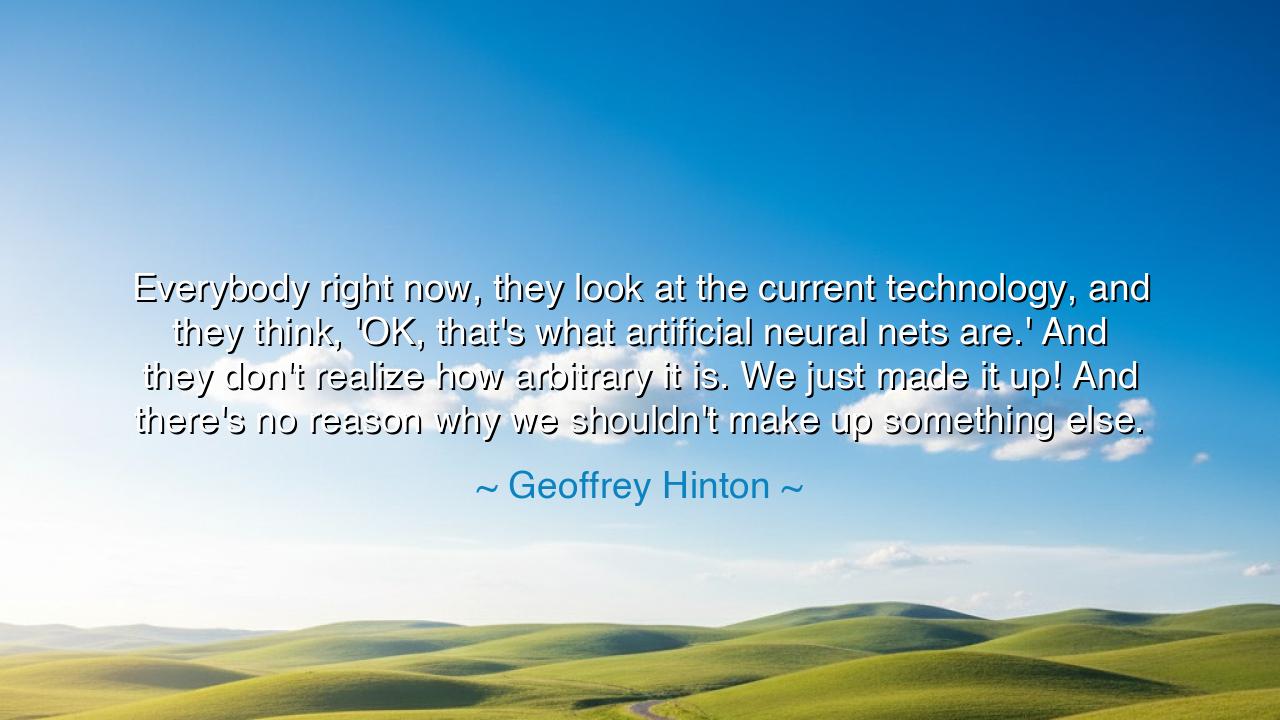
Everybody right now, they look at the current technology, and
Everybody right now, they look at the current technology, and they think, 'OK, that's what artificial neural nets are.' And they don't realize how arbitrary it is. We just made it up! And there's no reason why we shouldn't make up something else.






Hear the voice of Geoffrey Hinton, one of the great architects of our modern age: “Everybody right now, they look at the current technology, and they think, ‘OK, that’s what artificial neural nets are.’ And they don’t realize how arbitrary it is. We just made it up! And there’s no reason why we shouldn’t make up something else.” Though spoken of machines and algorithms, these words carry the resonance of ancient wisdom: that what is built by human hands is not destiny, but invention; not inevitability, but choice. The structures we live within are not eternal laws of nature—they are patterns imagined, tried, and tested by fallible mortals, and thus, they may always be remade.
Since the dawn of time, humankind has mistaken its tools for absolutes. The Egyptians built with stone, believing the pyramid form to be the pinnacle of construction. The Romans carved aqueducts, seeing their arches as eternal triumphs of engineering. Yet time and vision showed that no invention is final. The arbitrary designs of one age become the stepping stones of the next. Hinton’s words are a call to remember that our current systems, however mighty they seem, are not sacred—they are simply the latest experiment in a long chain of human creativity.
Think of the voyages of the Age of Discovery. Sailors once clung to the stars and simple compasses, thinking those were the limits of navigation. Then came the sextant, then the chronometer, and eventually the satellites that now guide ships with unerring precision. Each innovation shattered the illusion that the existing way was the only way. So too with artificial neural nets: what seems powerful now may one day appear crude, a mere child’s sketch compared to what the future will invent. The lesson is eternal—what we have “made up” today is not the final truth of tomorrow.
Hinton’s words strike especially at pride, that ancient enemy of progress. For when people look upon the present technology and declare, “This is the peak,” they fall into the same trap as those who once proclaimed that heavier-than-air flight was impossible, or that the atom could never be split. Yet visionaries break such chains by daring to say, “What if?” and by seeing the arbitrary nature of the present not as a prison, but as an invitation. It is humility before the unknown that leads to true greatness.
Consider the tale of the Wright brothers. The world mocked them, for countless inventors had failed in their quest for flight. Yet the brothers understood that the designs of their predecessors were not sacred, but arbitrary experiments waiting to be surpassed. Through endless trial and the refusal to accept limits, they took to the sky at Kitty Hawk, proving that the impossible was only the untried. In this story lies the same courage that Hinton demands: the willingness to see the present system as fragile clay, to be broken and reshaped until something greater emerges.
The lesson for us is clear: do not revere the tools of the present as eternal. See them for what they are—stepping stones, temporary vessels for human ingenuity. If you are an inventor, a dreamer, a thinker, remember that nothing is fixed. The neural nets, the systems, the paradigms of today are not the end—they are beginnings, waiting for the next mind bold enough to imagine anew. As our ancestors remade their world with wheel, fire, and printing press, so too must we be ready to remake ours with courage and imagination.
Practical wisdom follows. Question the systems you are given, whether in science, art, or daily life. Ask yourself: is this the only way, or merely one way? Train your mind to see the arbitrary nature of traditions, of designs, of structures, and then dare to suggest another. Do not fear the unknown, for the unknown is the soil of invention. Embrace patience, for every breakthrough is born of countless failures. And above all, keep alive the ancient flame of curiosity, for it is curiosity that leads us to build new worlds.
So carry Hinton’s words as a torch: what we have now is but a construct, “made up” by those before us. Do not worship it as divine, but treat it as clay ready for reshaping. For the future belongs not to those who guard the old walls, but to those who see them as temporary scaffolds, daring to build higher still. And when you doubt, remember: the greatest truths of tomorrow are waiting, right now, in the courage to imagine something else.






AAdministratorAdministrator
Welcome, honored guests. Please leave a comment, we will respond soon